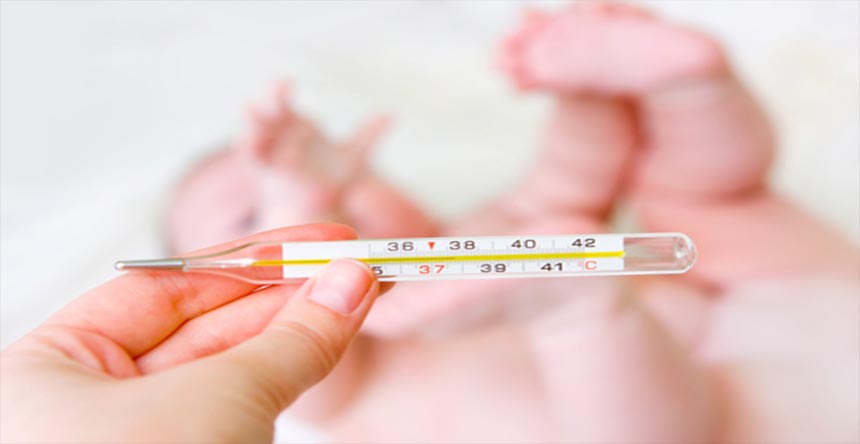
It’s early September in Ireland and while the more optimistic are talking about an Indian summer, I cant help but notice that all too familiar chill is back in the air! I’ve packed away the garden set, and fired up the central heating for the first time properly since May – “winter is coming “as the famous saying goes in Game of Thrones and with winter in Ireland there is normally sniffles, sneezes, coughing and sore throats!
If your new-born makes his or her debut during the colder months it's worth considering your baby’s first flu or cold and how you might manage avoid it for as long as possible during your child’s early development.
New-born infants don’t have the immune defence to keep viruses, bacteria and infections at bay the way adults do and are not only more likely to catch a flu or virus quicker, but are also more prone to having one for longer. Here are some issues and ideas to consider to keep your little one as healthy as possible this winter!
Vaccinations from birth.
Vaccinations are a powerful tool at your disposal as a parent and are a really simple and effective way at protecting children against even more serious disease and infection such as measles and Hepatitis. While there are some concerns in Ireland about the side effects of vaccinations on young children it’s commonly accepted that the pro’s far outweigh the cons. There is a recommended time schedule to vaccination from the HSE – In Ireland the first vaccination (for tuberculosis) is given at the maternity hospital just after birth. Timing is very important when it comes to vaccinations and the HSE will ask you to arrange 5 GP visits all the way up until your little one is 13 months old! The first visit should be arranged when your child is 2 months and is the 6 in 1 vaccine to protect against diphtheria, haemophilus influenza b (Hib), hepatitis B, pertussis (whooping cough), polio and tetanus. The PCV vaccine to protect against pneumococcal disease. The vaccines are given in your child’s legs – one in the right leg. Its impressive how organised the HSE is on this subject and they provide a fantastic guide including time tables, vaccination details and what to expect after each vaccination. You can view, download and print the guide here http://www.hse.ie/eng/health/immunisation/pubinfo/babychildimm/parentsguide.pdf
Avoid Crowds
It is recommended to avoid crowds during the first two months as much as possible and particularly public transport. If you have ever used the Luas or Dart during winter you will have experienced seeing large amounts of people coughing and sneezing and blowing noses! When you consider the of contact a person has with buttons, hand rails and seats on public transport it’s not hard to imagine how it’s one of the most common places to pick up a flu or virus. While this might be considered a little OCD - in February 2015 in Ireland we saw near epidemic levels of flu outbreak, which caused havoc in hospitals and with emergency services with GP’s even warning that their surgeries had not been as busy in over 10 years. Keep in mind that an Infection or virus that may be barely noticeable for an adult, could be much more easily picked up and felt for much longer for an infant. Keeping your new-borns exposure to situations like this at minimum is the best approach until they have had a chance to have their full course of vaccines and have built up their own immune system.
Breast Milk
A mother’s breast milk provides all the nutrition your child needs to grow strong and healthy but also contains a huge amount of immune boosting qualities for your baby including antibodies and white blood cells. The presence of these substances in breast milk provide a natural defence against a range of infections and viruses during breast feeding and long after.
Of course breast feeding with a virus or cold will could result in passing it on to your child- but the antibodies that a mother produces to combat the infection will also be transferred to the baby and will give them them the defence they need to fend of the cold or possible prevent the cold from catching or even from developing at all.
At Babasafe Ireland we are strong supporters of breast feeding and it's benefits and urge all parents to breast feed for as long as possible as baby formulas simply don’t offer the of protection that can be given through natural breast milk. Check out www.breastfeeding.ie – a fantastic Irish website dedicated to informing, guiding and encouraging Irish mums to breast feed.
Be Selective, it’s a VIP list!
You have to be a bouncer the first 6 months! Visitors can come in their droves when a baby arrives home for the first time! As tough as it may seem it’s super important to screen those coming to the house from the onset to ensure that none of them are bringing home aflu or cold that could be passed on to your infant.
Watch out for older kids who love to touch and cuddle new-borns! Kids nearly always bring home infections and colds from school and pre-school and as cute as it may be, it’s best to stop them from doing so in the early stages. After all the average kid gets up to 8 colds a year particularly while in preschool and crèche.
Kill Germs
It seems obvious but keeping your hands and surfaces that you and your child come into contact with clean will greatly reduce the spread of viruses & bacteria.
- Put hand sanitizer in the nursing bag and have a few bottles at home for when visitors come Hand sanitizers are as effective as washing your hands at killing germs , keeping a bottle just inside the door will remind you and those arriving to use it.
- Be aware germ danger areas around the house and even when you’re out. Use anti-bacterial wipes to wipe down door handles. Mobile phones, iPads and toys!
- Watch out when you visit the doctor’s surgery or paediatrician’s office - It’s easy to flick through the magazines or allow your child to play with toys in the waiting room! Most surgeries have sanitizers provided but considering the number of people arriving through a typical GP’s surgery with a flu or cold its worthwhile being vigilant!
- END-


